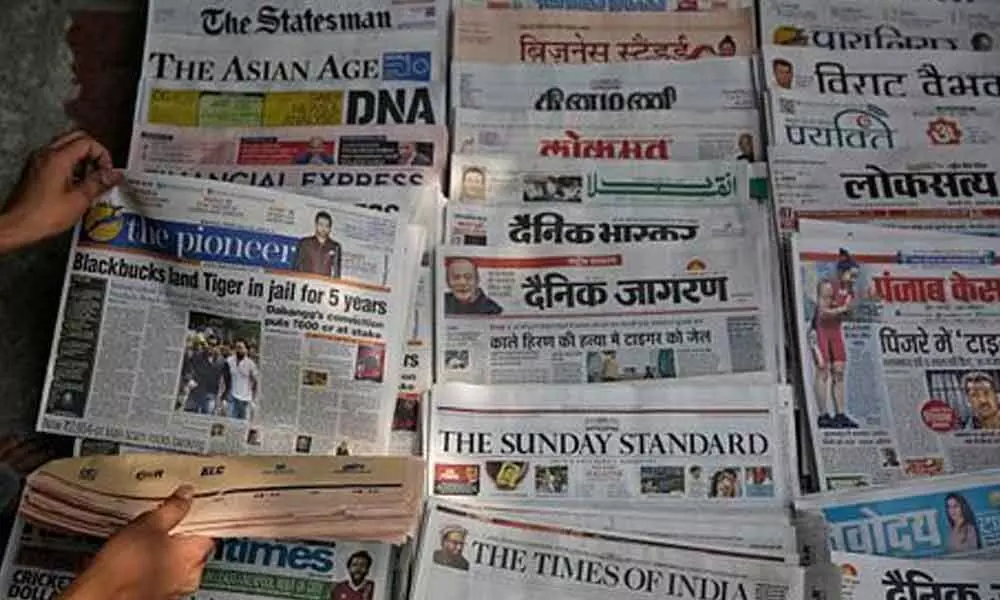The crumbling empire of print media

The crumbling empire of print media
There are webinars being conducted to discuss the impact of the pandemic on the media, as well as the future of print media
There are webinars being conducted to discuss the impact of the pandemic on the media, as well as the future of print media. The scenario is not encouraging. Print journalism has been the strong foundation upon which the fourth estate has been built.
Hickey's Bengal Gazette is credited to have been the first English newspaper published in India towards the end of the eighteenth century. This was followed by many more, like The Times, The Pioneer, The Statesman, The Hindu, The Tribune, Bombay Samachar, The Herald Goa, and slightly later by Hindustan Times and The Indian Express, followed by Deccan Herald and other publications.
Many of the entrants of the 20th and 21st centuries including The Hans India have been doing excellently. The regional languages too flourished starting from the early19th century with Udant Marthand, Gujarat Mitra, Kesari, and so on followed by numerous others from the early 20th century onwards. There have been around one lakh publications of various editions, with dailies ruling the roost in the circulation aspect.
The earlier times spanned the golden era when people had time to sit with a newspaper in their hand and a hot cuppa to boot. The leisurely pace of the bygone days are to be only visualised and envied today.
Around a decade and a half ago when I used to commute an hour to work I would grab the daily and try to read it in the rumbling bus, until my eyes ached. There was always so much to read and enjoy. The thought provoking editorials and articulate freelancers' columns were my favourites. The topics covered ranged from current affairs to the mundane. Each and every daily had such articles in plenty.
When I was a young student I remember that we were being encouraged to read wordy articles in established newspapers to improve our language. Recent times have seen Gen Y and Z consuming news on the go in bits via their cell phones on social media rather than through the meaty bites offered by the newspaper.
The hard copy is cherished for its old charm value, its rustling sound, the lack of need to plug in, and also because the article earmarked in the folded newspaper stays put, to be read and re-read if needed.
The advent of the online versions did not sound the death knell for the hard copies as die hard fans still clung on to the old faithful. The e-versions only made our newspapers accessible from across the world offering unlimited pleasure and solace to our brethren settled or visiting abroad. If not for the e-version, sitting thousands of miles away from my country, I would not have known about the demise of an old family acquantance.
Every crisis in the world has triggered sales of newspapers, with news hungry people devouring any article related to the crisis. All of a sudden a virus has changed all this. The print version struggled for sales during the lockdown phase, and having fallen, is unable to garner sales like before, even post lockdown.
Economy, advertisemnet and sales are like three corners of the deadly Bermuda triangle. The media ship rocks if any one angle turns unstable. The irony is that nowadays fear of the very grist feeding the media is keeping people away from the print media. The editions and number of pages have been slashed to save on overheads, thus affecting the e-paper too, content wise.
Some e-versions have taken recourse to the pay wall. The magazine houses on their part are not able to deliver to postal subscribers nowadays who would naturally not care to renew their subscriptions. Many in the media industry are finding themselves out of work.
Who would have ever thought that the fourth estate would run out of steam? The style of functioning is slowly changing with work from home editors and phone- based information collection.
The pandemic has taught us that an established citadel too can be overturned, and the crumbling dust has fallen on the freelance writer, hardworking journalist and the discerning reader too. But to end on an uphill note I quote, "It's amazing how a little tomorrow can make up for a whole lot of yesterday". So let us hope that there will be a turnaround in the morrows to come and the print media gets back its glorious throne.

















